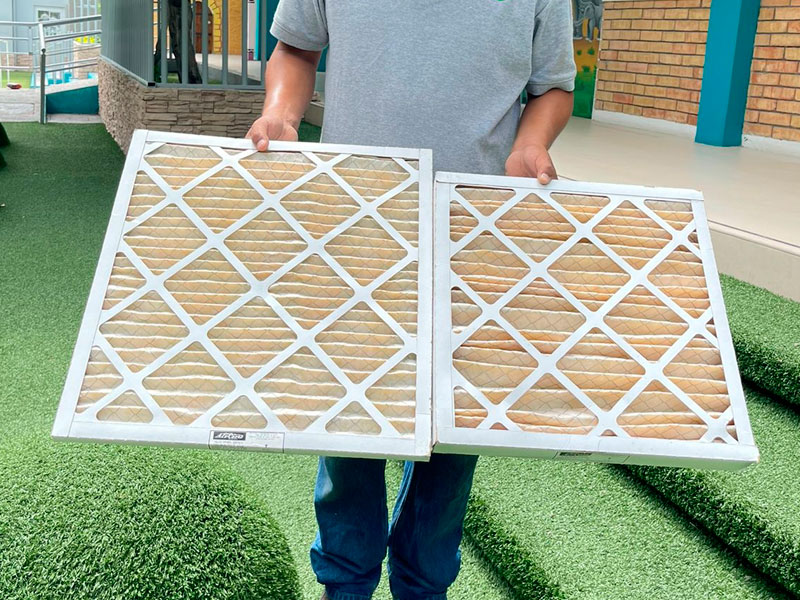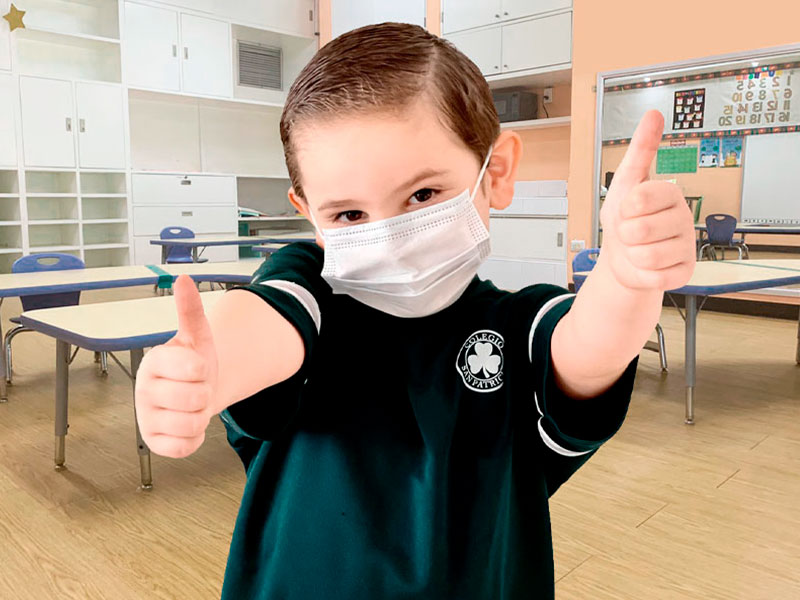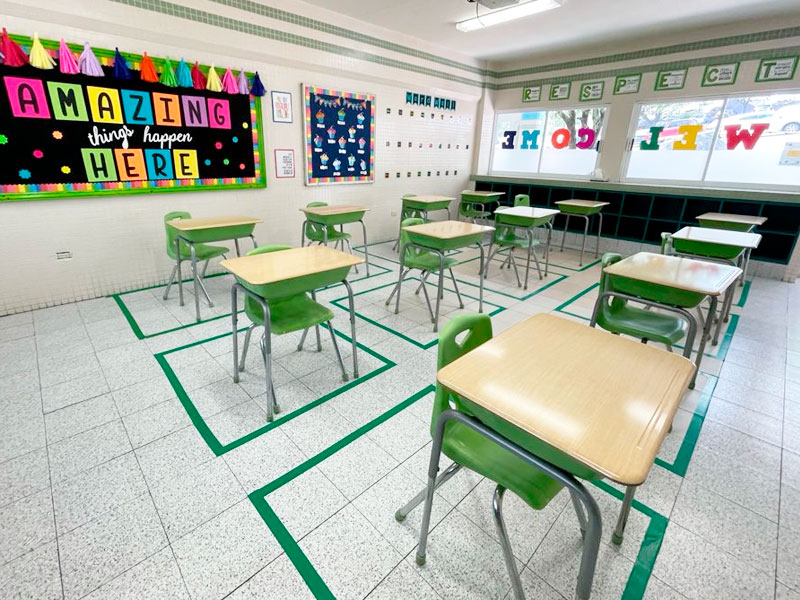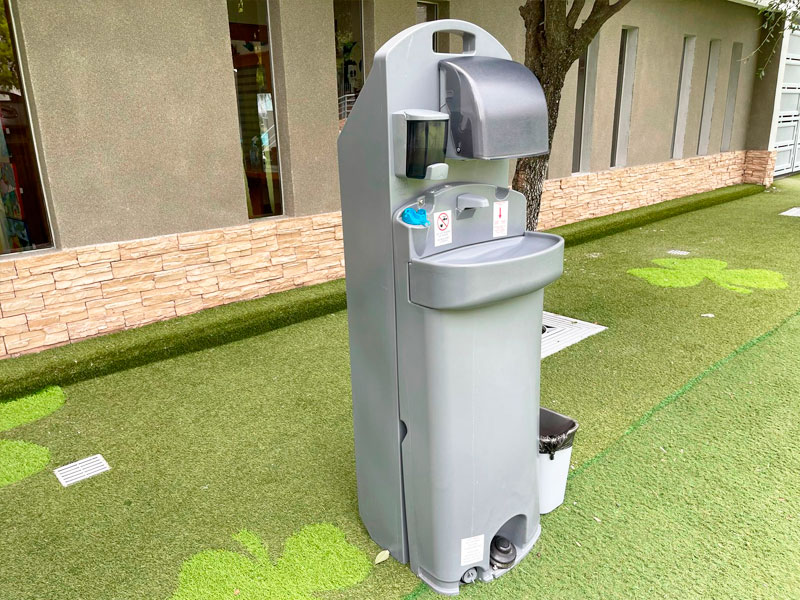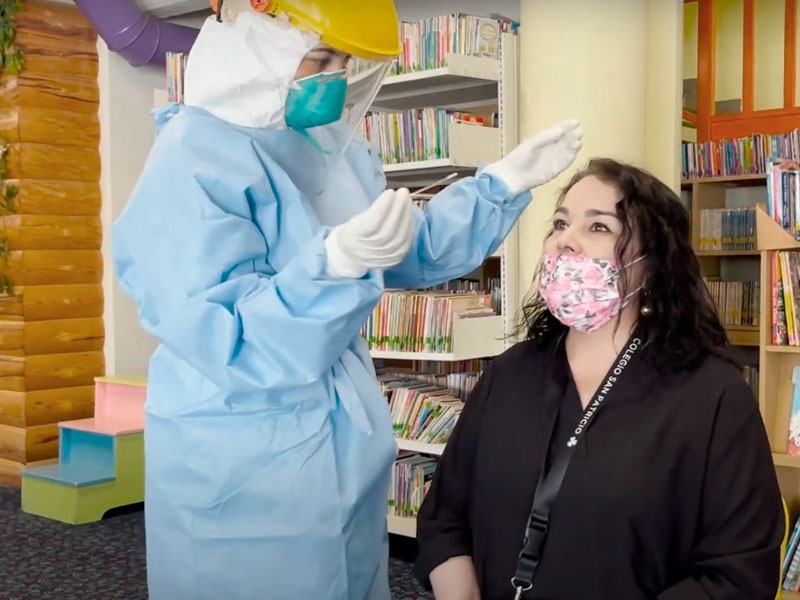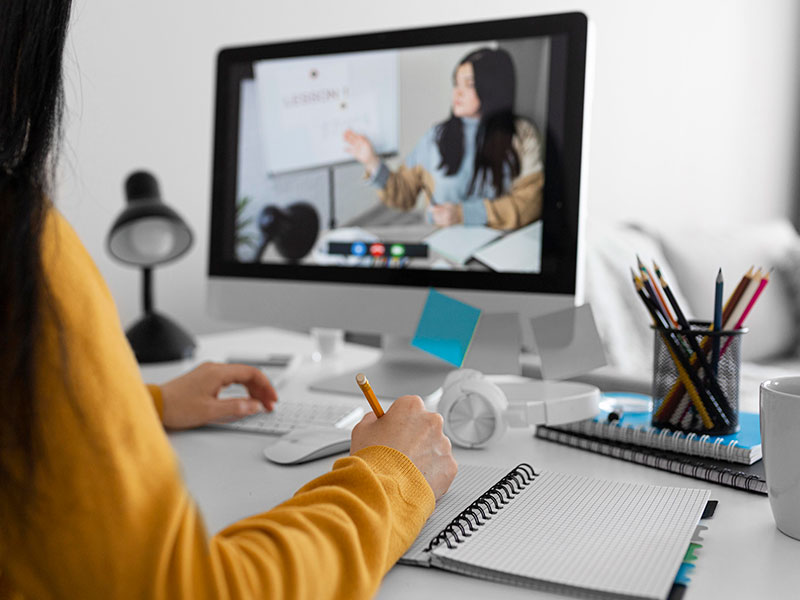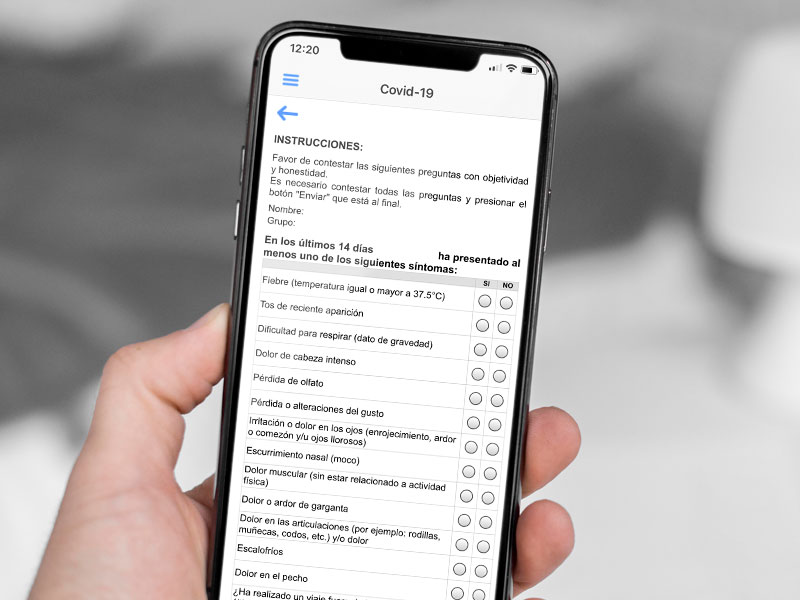COVID-19 Prevention and Proteccion Measures
THE IMPORTANCE OF VENTILATION
Today, privileging the natural ventilation is essential, for it has proven to lower the risks of infection of SARS COV-2, as well as other airborne viruses.
At San Patricio International School (SPIS), reducing the infection risk to the minimum is a priority, so natural ventilation is and will be favored.
Our classrooms have the benefit of wide windows, which, when open, contribute to air renovation.
We know that providing an educational space that brings comfort to our students is a very important aspect, thus the rooms will be intermittently air-conditioned, which will allow us to accomplish that sensation of comfort without letting us forget our primarily action: favoring natural ventilation to minimize the infection risk.
Some of the actions related to ventilation and air-conditioning that were implemented at our facilities are:
- Cleaning and disinfecting air-conditioning ducts.
- MERV 11 filter installation – These filters are used in commercial buildings and at hospital laboratories.
- Bipolar Ionizers installation that comply with the necessary standards and certifications for their use at schools and facilities, and which are certified with Security UL2998. EPA (Environmental Protection Agency) recommends using devices that have this certification, for itguarantees zero ozone emissions.
https://www.epa.gov/coronavirus/can-air-cleaning-devices-use-bipolar-ionization-including-portable-air-cleanersand-duct
CO2 METERS
Due to aerosols being a propagation risk, measuring air quality is of vital importance.
Measuring the amount of CO2 in an enclosed space is essential, and, since humans breathe oxygen and exhale carbon dioxide, we will have CO2 meters that will allow for the monitoring of air quality in all our spaces.
In case of reaching non-optimal CO2 levels, the protocolary measures will be taken to allow an adequate air renovation.
FACE MASKS
The strict and correct use of face masks in our institution is obligatory at all times (applied only to 2 years of age and older).
At SPIS, the correct use of face masks will be supervised; the person that does not comply with this measure, will be notified so as to attend classes remotely.
Face masks with required standards:
- Three-layer
- KN95
Valve or knitted masks are not authorized.
The best face mask is the one that adjusts over nose and mouth, leaving no open spaces.
EDUCATION BEGINS AT HOME
Being part of an educational community leads to everybody acting responsibly.
As parents, we must be the example and perform all the protection measures towards COVID-19, promoting the correct actions and generating a co-responsibility culture to accomplish a common good.
At all times must we follow the recommendations of our authorities:
- Wearing face masks
- Washing our hands
- Social distancing
- Avoid crowds
- Monitoring every family member’s health
A safe return is everyone’s responsibility.
PHYSICAL DISTANCING
One of the essential points for lowering the infection risk of COVID-19 is to keep a physical distance among people. School policies and structural interventions have been established to promote a safe distance.
To accomplish this, SPIS has taken the following actions:
- Reorganizing classrooms to increase space among desks, thus keeping a safe distance; likewise for spaces destined for teachers and administrative offices.
- Route signaling for mobility within school facilities
- Avoid crowding common areas; internal mobility, students’ entrances and exits.
- Maximum limit of visitors, volunteers, and non-essential massive activities
Keeping a safe distance while doing our activities, we contribute to taking care of us and of everyone else.
HAND HYGENE
The frequent washing of hands is the easiest, most accessible and efficient way to avoid diseases. Through the correct hand-washing with water and soap, for at least 20 seconds, the infection and virus propagation is reduced significantly.
In the midst of this pandemic, it is vital to encourage this activity.
International institutions recommend using hand-sanitizing gel after each hand-washing.
At our campuses, we have fixed and portable stations for hand washing.
INTERNAL METERS FOR SCHOOL MONITORING
As a monitoring and timely detection plan for a possible positive COVID-19 case, SPIS teachers, administrative and operative staff will be tested for COVID-19 every fifteen days.
All students over the age of two will be asked for a negative COVID-19 test of no longer than 72 hours on the day scheduled for their admission.
In case of any trip, the community that attends school in person must do it virtually for 7 days to comply with the preventive isolation period. Once the period is completed, you will be asked to take a COVID-19 test and deliver negative results for your campus re-entry.
TRAINING
At SPIS all personnel: teachers, administrative, and operational have taken the courses available at CLIMSS related to their working areas, as well as the internal trainings that have been offered. We are convinced that being informed and updated is one of the best tools to reduce the virus propagation.
COMMUNICATION
Knowing the school’s community’s health status is of vital importance in keeping track and stopping a potential infection chain. Therefore, we have a COVID Questionnaire on the NEMAX app for workers and students to answer daily, which will allow for a control measure of the SPIS population.
The best way to prevent the virus propagation is the sum of all these measures.
FREQUENTLY ASKED QUESTIONS
1. How are you properly ventilating classrooms and workplaces?
Windows and doors will stay open when weather conditions allow increasing outdoor airflow. AC units, equipped with WHO-approved MERV 11 filters, will be turned on at specific times to help maintain a comfortable temperature in the classroom for both students and teachers. Classrooms will also have CO2 monitors.
5. How often will testing for COVID-19 be required?
- All teaching, operational, and administrative staff will receive biweekly COVID-19 tests.
- All students aged two and older must show proof of a negative COVID-19 test taken within 72 hrs. of the first day of school attendance.
- Additionally, all students will be randomly chosen to receive a COVID-19 test once a month.
- To support the SPIS community, agreements with OrangeLab and Laboratorios Terranova to offer special rates on tests and other services.
6. Does the SPIS medical insurance covers COVID-19-related problems?
No, this medical insurance policy only covers injuries sustained while at the campus. No COVI-19 related or other illnesses are covered under this policy.
7. What happens if I don’t answer the NEMAX COVID-19 questionnaire?
The NEMAX COVID-19 questionnaire result page is required for all SPIS students and personnel. Please answer each question truthfully, first thing in the morning, and for each of your children. To enter the campus, you must show the GREEN result page.
8. What happens if a student arrives at school (school filter) showing COVID-19-like symptoms?
Students who show any COVID-19-like symptoms will not be able to enter the campus.
9. What happens if a student shows COVID-19-like symptoms during the school day (classroom filter)?
Students who show any COVID-19-like symptoms during the school day will be isolated in a special area. The student’s parents will be asked to pick that student up and seek medical attention. The student’s return to school will be dependent on the results of the medical examination.
10. Why is the use of the school uniform important?
Using the school uniform contributes to the student’s self-presentation and prepares them for the school day. The uniform can help develop an identity towards the school, and it makes the student feel comfortable and equal among their classmates.
11. Can we use the old logo school uniform?
Yes, all old logo school uniforms are valid as long as they look in good condition.
12. What’s the due date to obtain the school uniform?
You have until November 1st to purchase the school uniform.
14. Why use see-through backpacks?
See-through backpacks are a strategy that is part of “operación mochila” and the “Safe School” program. The see-through material allows for smoother and faster entry protocols, where non-permitted objects like toys and electronic devices are easily identified.
15. Can siblings from different academic levels exit through the same gate?
Yes, you must notify the headroom teachers to make the necessary preparations.
17. What is the bathroom use protocol?
Just like any other shared space, bathrooms have a set capacity. Spaces have been appropriately marked to maintain a safe distance, and dedicated staff will constantly monitor and clean the areas to assure optimal conditions. All cleaning products have listed fact sheets approved by the Health Ministry.
18. Are facemasks mandatory?
Yes, students aged two and older must wear a facemask at all times while on campus.
19.- Are the drinking fountains available?
No, at the moment, the drinking fountains are disabled. We ask that all students carry with them bottled water.
20. Is the extended stay service available?
At the moment, SPIS will not offer extended stay service. We will let you know as soon as that service is restored.
21. How will after-school programs work?
PAP will virtually begin their classes in the afternoon and transit to in-person sessions as soon as they are authorized.
Sport classes will begin once they receive authorization.
22. Is it necessary to purchase the complete list of materials?
Yes, SPIS has only requested the essential materials required for both school models.
23. What are the travel protocols?
In case of travel, the family must be in a seven-day self-isolation period. Once this period is over, proof of a negative COVID-19 test will be required to return to in-person classes.
24. What does the student technology fee cover?
The technology fee supports digital services used in both hybrid and virtual models such as internet access, e-mail, security, help services, learning content, and content management software, computer labs, library resources, and wireless networks. All these services enhance the student learning experience.

